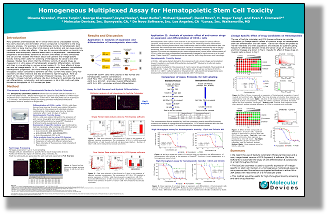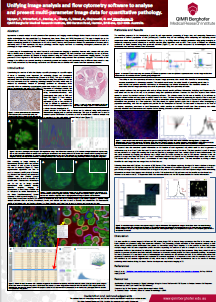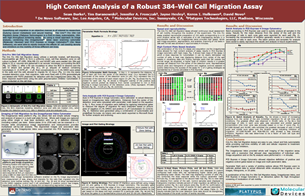Homogeneous Multiplexed Assay for Hematopoietic Stem Cell Toxicity
Oksana Sirenko1, Pierre Turpin1, George Klarmann3,Jayne Hesley1, Sean Burke2, Michael Sjaastad2, David Novo2, H. Roger Tang1, and Evan F. Cromwell1
1Molecular Devices, Inc. Sunnyvale, CA, 2De Novo Software, Inc. Los Angeles, CA, 3Lonza, Inc. Walkersville, MD
Presented at Lab Automation 2011
Abstract:
Many potential pharmaceuticals fail in clinical trials due to unacceptable toxicity, thus early discovery and elimination of toxic compounds is important to the drug discovery process. For example, in chemotherapy toxicity to hematopoietic stem cells (HSC) or bone marrow often limits dosing and duration and can cause anemia, neutropenia, or other side effects. One way to improve information on toxicity is to introduce more biologically relevant assays early in development. Hematopoietic progenitors are extremely sensitive to the toxic side effects of many compounds and can provide valuable information about both general and lineage-specific toxicity making them useful for screening of therapeutics for cancers and other diseases. Studies have shown that the inhibitory activity of several drugs, as measured in in vitro assays of hematopoietic progenitor differentiation, correlate with their in vivo activities in various animal models (2, 3). Toxic effects of drugs can also be lineage-specific (4, 5). However, primary cells, especially non-adherent hematopoietic progenitors, are more challenging to use in automated high-throughput assays compared to adherent cell lines. Current HSC assays using flow cytometry are labor intensive and less amenable to high-throughput. Here we report on the use of IsoCyte cytometer (Molecular Devices, Inc.) and FCS Express® 4 Image Cytometry software (De Novo Software) to automate the study of cell differentiation, cytotoxicity, and carcinogenesis in 96 or 384 multi-well plate formats at throughputs of 3-5 minutes per plate.

(Click image to download)
 Explore the Scientific R&D Software
Explore the Scientific R&D Software
 Explore the Scientific R&D Software
Explore the Scientific R&D Software 















